- Home
- Jane Peart
Fortune's Bride Page 2
Fortune's Bride Read online
Page 2
In the last week, she had followed Graham on his plantation rounds and he had pointed out the tobacco fields ripening a golden-brown in the September sun. The orchards, too, blazed with the colors of harvest, and the kitchen help was kept busy canning and preserving the rich yield of apples and pears.
Turning back to the room, Avril left her daydreaming and pulled her nightie over her head, anxious to dress and be off in search of Graham. She raced about the room, gathering up the clothes she had flung carelessly aside the night before. Well, thank goodness, Dilly had not come up to tuck her in, so she had not been around to scold. Her nurse was still smarting from the abrupt changes wrought by the deaths of her master and mistress, and missed her kin in Mississippi. Last night she had been complaining about that very thing when Graham allowed Avril to stay up past her bedtime to finish a chapter in the book they were reading aloud together. Dilly, already vexed, had gone off in a huff to the servants’ quarters and hadn’t been seen since.
How could one be unhappy on such a glorious day? Avril mused, feeling the slightest bit sorry for her old nurse. But the next minute, as she drew the hairbrush through her long mass of red curls, she was again relieved that Dilly had not appeared. She always made such a fuss over Avril’s hair, tugging at each tangle till it broke free and lay smooth and shiny over her shoulders. Now Avril made short work of it, looking around for a ribbon. Spotting one she had discarded on the floor beside her bed, she quickly gathered up her hair and twisted it until she could wind the blue silk around it and tie a bow.
For a moment her attention was diverted by the twin silver-framed miniatures of her parents on the top of her dressing table. Precious Papa and Angel Mother! She felt a momentary pang of loss, then realized that she no longer missed them as much as she had at first. Feeling almost guilty about her newfound happiness, she picked up the pictures, kissed the painted images, then replaced the frames on their stands. Silly Avril, she thought. Who would be happier than her parents that things had worked out so well? After all, it was their wish that she come to Virginia to live with Graham. Then, still buttoning her bodice, she ran out of her room and down the stairs in search of her guardian.
Halfway down the stairs, she halted. From the first floor the sound of voices floated up to greet her. Visitors! she thought, making a wry face. She hoped they wouldn’t stay long. It was so pleasant having Graham all to herself, making plans for the day. Sometimes, when company came, the grownups went on talking forever.
Hesitating on the landing, Avril considered slipping through the hall and out to the kitchen to beg some cornbread from Cookie, who doted on her since there had been no children at Montclair for years. From there she could go out to the stables and wheedle Ben, the head groom, to saddle Fancy for her. Though riding by herself was not half so much fun as riding with Graham, it would be better than sitting out the tedious conversation of adults. But the tantalizing aromas of fried ham and fresh-baked biscuits and the pungent smell of coffee wafted up enticingly, triggering her healthy young appetite. Avril gave a little shrug and skipped down the next few steps.
At the door of the dining room she paused uncertainly. The visitors were strangers, not the Barnwells from Williamsburg as she had supposed. Graham did not entertain, and most callers were relatives.
Seeing Avril standing there, Graham called to her. “Come in, dear. Here are some friends I’d like you to meet.”
The dining room was mellow with sunlight streaming in the long windows from the porticoed porch. At the polished mahogany table with Graham sat a lady and a gray-haired gentleman, whose murmured comments ceased as Avril entered shyly.
‘These are our neighbors from Cameron Hall, Judge and Mrs. Hugh Cameron, who have been abroad for a year. And this,” he gestured almost proudly, “is Avril.”
“Avril? What a charming name.” The lady’s voice was sweet and soft and she rested her dark eyes kindly on Avril as Avril slid into the chair in her usual place beside Graham.
“It’s French for April—the month,” she explained.
“But, of course!” Mrs. Cameron exclaimed, looking knowingly at her husband. “Her mother was a Duchampes from New Orleans and you know the Dumonts—”
The gray-haired man nodded and continued to regard Avril thoughtfully.
“We knew your mama, my dear,” the lady went on. “Actually, we attended your parents’ wedding. She was a beautiful bride and Paul, such a handsome young man. What a pity!”
Graham cleared his throat with a note of warning.
“You must bring Avril over to Cameron Hall very soon, Graham,” she said, changing the subject adroitly. “Or she could take the trail through the woods. Our boys ride those paths nearly every day. It would do those rascals good to polish up their manners and learn to entertain a young lady.” She gave Avril a conspiratorial wink. “Our sons, Logan and Marshall, run quite wild through the countryside, I fear, with no gentling influences. Thank goodness, they’ll be going off next year to an English boarding school.”
“And you’ll be bereft without them,” Graham correctly surmised.
“Oh my yes, I suppose I shall! But then, to make up for their absence, perhaps I can take Avril under my wing. I should love having a girl around after putting up with those two madcap boys all these years!” Mrs. Cameron’s gay little laugh softened the sharp commentary on her sons’ conduct.
After that the conversation passed to other things—local events, people, and other items of interest to the three adults. Avril, who had finished eating, did her best to suppress her restlessness, all the while wishing the Camerons would leave. But here came Hector with the silver coffeepot, refilling the fragile china cups with freshly brewed coffee!
At last, unable to contain herself a moment longer, Avril caught Graham’s eye. “May I be excused now?”
He nodded his assent and she slipped out of her chair.
“Say your farewells to our guests first, Avril,” he reminded her gently.
Avril went to each and curtsied, as she had been taught to do, extending her hand politely. But Mrs. Cameron took her face in both her cool hands and gazed at her tenderly.
“We’re so happy you’re here at Montclair with Graham, my darling. I do hope you and I can become great friends.” Then she brushed back the straying red locks and smiled at Graham over Avril’s head. “Graham, I’d like to see that this child has some new clothes now that her period of mourning is almost passed. A year for one so young is really quite enough, don’t you think? I’m sure we could find some lovely materials in Williamsburg and have some pretty dresses made up for her. May I borrow her some day soon and take her into town with me?”
“Of course, May. That is, if Avril would like to go.” Graham looked askance at his ward.
But before she could answer, Mrs. Cameron spoke up again. “But of course she would, wouldn’t you, darling? There’s not a girl in the world who doesn’t adore shopping for new clothes. It’s settled then. We’ll just have to decide on the time. I’ll send over a note in a day or two after I’ve made the arrangements.” Then she turned to Avril again. “You see, my dear, since we’ve just returned from our long journey, there is much to attend to at home. But now that we’re back, we shall be seeing a lot of you both. Oh, it will be such fun!” she laughed gaily, almost like a girl herself.
‘Thank you, Mrs. Cameron,” Avril murmured, now anxious to leave and go out into the sunny morning.
“Oh, child, don’t call me Mrs. Cameron. That’s much too formal. Do call me Auntie May, just as my sister’s children do. It would please me very much.” And she gave Avril a quick hug.
Out in the hall Avril stood for a moment, wondering whether she should go find Dilly or go straight to the stables. Unless the Camerons left right away, Graham would not be able to go riding with her until later. As she hesitated Avril heard her name spoken and could not resist lingering to hear what was being said about her.
It was Mr. Cameron’s deep, resonant voice that carried first.
“It is expedient, Graham, that it be done without further delay. From the communications I have received, I have no doubt they will proceed, and all will be lost. My information is that they are without scruples, with not a shred of compassion. You must act quickly or—”
“Have you not said anything to the child?” This was Mrs. Cameron’s anxious voice.
Now Graham’s, speaking in a low, concerned tone. “But she is so young—just turned twelve last week. How can I explain so that she will understand the necessity for such a plan?”
“Leave that to me, Graham. As a lawyer I think I can make it simple and clear. After all, it is only a protective measure until she reaches her majority.”
Avril stiffened, standing rigidly as the strange words fell on her ears. What were they talking about? What did it mean? Why did Graham sound so troubled?
She felt a chill, and a little shudder coursed through her small bony frame. Outside, the sun went behind a cloud, darkening the little circle of light in which she had stood.
Somehow Avril wished the Camerons had never come. They had brought some kind of news, something that was going to change her life here at Montclair. Avril didn’t really know how she knew that. She just knew.
chapter
2
RETURNING from her morning ride one day, Avril cantered onto the cobblestone stableyard, observing that the heat seemed more like midsummer. As she passed the side of the house, she caught a glimpse of a familiar carriage. The Camerons’ driver was leaning against one of the elm trees, whittling under its leafy shade.
Avril felt a pang of dismay. In the two years she had been at Montclair Avril had come to love Auntie May, but sometimes her visits proved inconvenient. Like today. Graham had promised to ride with her later in the afternoon. He wanted to exercise his new horse, a powerful gelding, hoping to temper the animal’s headstrong nature alongside the gentler Fancy.
She rubbed the nose of the mare affectionately before handing the reins to one of the grooms. Instead of entering the house through the front door and thus risking an encounter with the visitors, Avril took a shortcut through the kitchen garden. She proceeded up the steps of the side porch and slipped into the house through the French windows of the library. Tiptoeing over to the double doors leading to the hall, she opened them cautiously, and peered out.
Noting that the doors of the drawing room were shut, Avril debated the advisability of running lightly past, on the chance that she could escape being seen. Certainly it wouldn’t do for Auntie May to find her in this state of dishevelment—cotton blouse stained and damp with perspiration, the skirt of her riding habit tucked into her boots. Her braided hair had come loose and now tumbled about her shoulders, the restraining ribbon lost somewhere in the woods.
Auntie May, who was fastidiousness itself, always eyed Avril with a kind but critical eye, automatically tucking back an unruly curl, straightening a collar, or retying a sash. The gestures were made lovingly, but Avril tried to look her best when she knew their neighbor was coming to call.
The decision was made. She would have to make a run for it. Taking off her boots, Avril started across the polished floor toward the stairway in her stocking feet. As she did, there was a peal of light laughter, followed by the mention of her name.
“You will not believe the change in Graham since Avril came, my dear. Remember how concerned we all were about him?” Auntie May was saying.
Ignoring the old adage Dilly often repeated—“Keyhole listeners doan never hear no good ‘bout theyselves”—Avril waited very still, determined to discover why she and her guardian should be the topic of conversation.
“We thought he would never get over losing Lulie,” May continued. “I mean, his grief went way beyond the bounds of reason. Of course, we expected him to observe the usual period of mourning, but after the first year we became worried. It went on, month after month, his staying here at Montclair, refusing all invitations, rebuffing all his friends’ well-intentioned suggestions that he come out into society again. I do declare, it’s a miracle how Avril’s coming seems to have shaken him out of his self-imposed exile!”
Avril clapped her hand over her mouth to suppress a giggle. She—a “miracle”? Still she felt a small, smug sort of satisfaction at having brought such a welcome change to Graham’s life.
Then she heard another voice with a musical, lilting tone. The speaker, obviously a woman, spoke so softly that Avril could not hear the question, only Auntie May’s answer.
“Oh, still very much a child! And I’m afraid Graham has let her run fairly wild. But what could a man with no experience of children know about raising a little girl. Then she was a victim of such a cruel tragedy, both parents dying within a few days of each other, you see. Graham’s sympathy has probably outweighed his judgment. Hugh has tried to offer guidance and I have done what little I could do. But I’m sure you’re quite right, dear Clarice. Your suggestion is well-advised. We will, however, have to put it very diplomatically if Graham is to understand the need—”
Avril would have liked to linger long enough to learn just what Auntie May meant, but at that very moment she heard the clatter of horses’ hooves on the shell drive and turned just in time to see Graham dismounting in front of the veranda. He handed the reins to a stable boy and headed for the house. In another minute he would come inside and catch her eavesdropping—and in this grubby attire! Scooping up her boots in one hand, her skirt in the other, she dashed up the stairs.
Reaching the top, Avril leaned over the banister and saw Graham stop in front of the round gold mirror with its sculptured eagle. He straightened his cravat and smoothed back his thick, dark hair. Then, placing his riding crop and gloves on the hall table, he made his way to the drawing room. At his entrance Avril heard the happy rise of the ladies’ voices in greeting.
She made a little face. She hoped the company wouldn’t spoil her evening with Graham. If they stayed—
“Where you been at, Missy?” demanded a sharp voice from behind, and Avril jumped and spun around to find Dilly, hands on hips, scowling disapprovingly. Dilly still treated her as if she were a baby, Avril thought, ready to defend herself.
But Dilly did not wait for an explanation. “Jes’ look at you,” she scolded. “You looks lak a fiel’ hand—no shoes, dress all rumpled and dirty, and where is yo’ hair ribbon? I declare, I doan know what we’s goin’ to do wid you! Runnin’ all over de countryside lak one ob dem harum-scarum boys—dem Camerons! You gettin’ way too old to be playin’ wid nuthin’ but boys. Now you come along wid me, missy. Missus Cameron and her lady friend are waitin’ downstairs fo’ you. Hurry! We’s got some job to git you cleaned up and prettified ‘fo you shame Mastuh Graham!”
Twenty minutes later Avril, wearing a lime-green cambric muslin dress, with her hair brushed and held back with a dark green velvet bandeau, passed Dilly’s inspection and went down the stairs, curious to know the identity of Auntie May’s “lady friend.”
Peering around the drawing room door to take a look before she herself could be seen, Avril saw Auntie May pouring tea. Opposite her, on the sofa, sat Graham and a lady as lovely as any princess out of a storybook.
The lady’s head was turned toward Graham and her profile was as clear and delicate as a cameo. She had a narrow, arched nose, sloping forehead, and long, slender neck. Rich brown hair was piled and looped into an elaborate coiffure, and she was wearing an exquisite gown of deep apricot silk with lace-edged ruffles outlining the bateau neckline and the long sleeves at the wrists. One graceful hand held a teacup while she listened in rapt attention to something Graham was saying.
Fascinated, Avril unconsciously stepped into view.
Seeing her, Auntie May called out, “Ah, here she is now! Come in, Avril. There’s someone who wants to meet you.”
Avril felt the other lady’s eyes coolly appraising her as she took a few steps into the room. Suddenly she felt like an insect under a magnifying glass.
Auntie May’s next words
did nothing to relieve the tension. “How well Avril looks, Graham. All this country air and good food has done wonders for her. She’s certainly not the scrawny little thing she was when she first arrived.”
Avril flushed, feeling awkward. Why did grown-ups, even Auntie May, talk about children as if they weren’t even there? Graham never did. She shot him a grateful glance, but he was looking at his other guest so did not see her silent plea for support.
“Avril, this is my dear friend, Lady Fontayne—”
“Oh, please, May, not so formal!” protested the other in mild dismay.
“Well, you were married to a member of the English nobility. We cannot forget that!”
“But I am an American, born in Virginia, remember? I only married a titled Englishman. But we spent so much time traveling on the Continent that we scarcely ever used it. However, that is all in the past, and now that I am a widow and living again in America, I wish only to be addressed as an American. After all, was not our War of Independence fought to free us all from the tyranny of titles?” Though the words were spoken lightly, there was no mistaking the determination in her tone.
“As you like, my dear,” conceded Auntie May. To Avril, she explained, “Clarice and I were girlhood friends, and though she lived for many years abroad, she is back now—this time to stay, we hope!”
“Well, we shall see about that.” This time Mrs. Fontayne’s laugh was strangely grating to Avril’s ears.
“Clarice is staying with us at Cameron Hall just now and we are trying to persuade Graham to come away with us for the evening. Hugh and I are having a few of her old friends in to greet her after her long absence. Do say you will come, Graham!” May pleaded.
Graham laughed and shook his head. “It’s difficult to resist you, May, but not tonight.”
“But why not?” This came from Mrs. Fontayne.
“Well—,” began Graham, but Auntie May interrupted.
“Now, don’t say we’ve given too short notice. If I sent you an invitation a week in advance, you’d have a hundred excuses by then. We must properly welcome Clarice home, mustn’t we? Besides, my dear, you’re in need of some lively adult company for a change, and I can promise you that!”

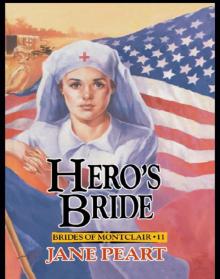 Hero's Bride
Hero's Bride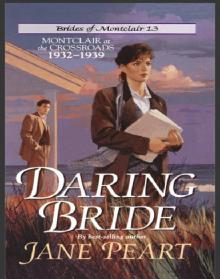 Daring Bride
Daring Bride Runaway Heart
Runaway Heart Promise of the Valley
Promise of the Valley Gallant Bride
Gallant Bride The Pledge, Value
The Pledge, Value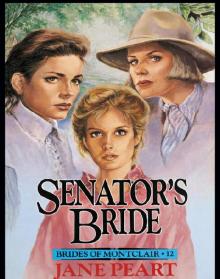 Senator's Bride
Senator's Bride Valiant Bride
Valiant Bride Shadow Bride
Shadow Bride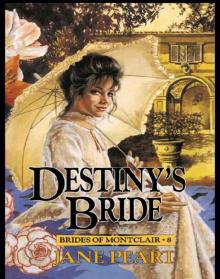 Destiny's Bride
Destiny's Bride A Tangled Web
A Tangled Web Folly's Bride
Folly's Bride The Promise
The Promise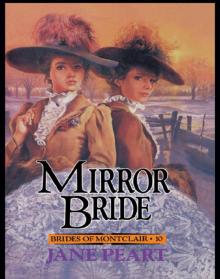 Mirror Bride
Mirror Bride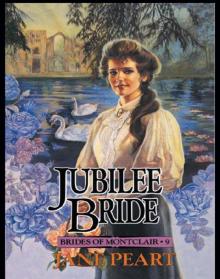 Jubilee Bride
Jubilee Bride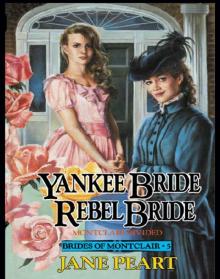 Yankee Bride / Rebel Bride
Yankee Bride / Rebel Bride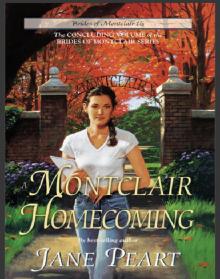 A Montclair Homecoming
A Montclair Homecoming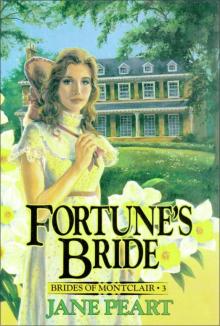 Fortune's Bride
Fortune's Bride Undaunted Spirit
Undaunted Spirit Love Takes Flight
Love Takes Flight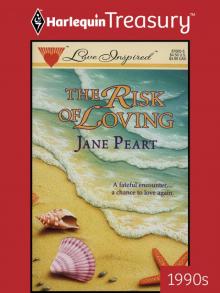 The Risk of Loving
The Risk of Loving The Pattern
The Pattern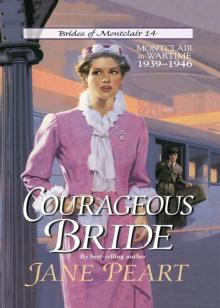 Courageous Bride
Courageous Bride